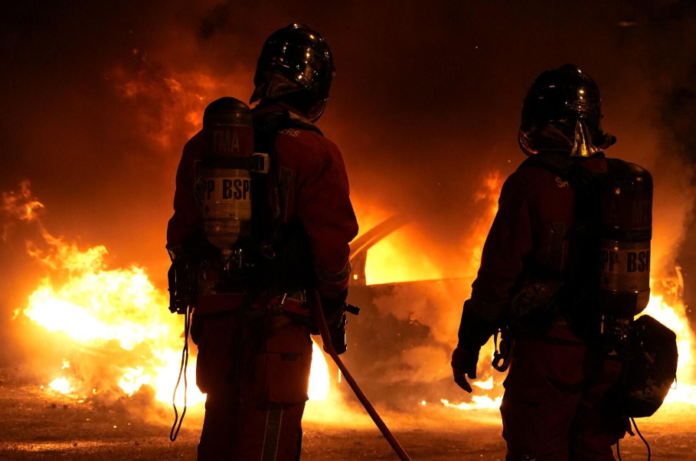France is reeling from widespread violence after a surprising exit poll predicted a left-wing coalition’s lead in the snap election, dealing a blow to Marine Le Pen’s ambitions of forming the country’s first hard-right government since World War II.
Startling footage depicts hooded and masked protesters running through streets, launching flares, and igniting fires, against the backdrop of 30,000 riot police deployed across France amidst heightened political tension.
The hard-right National Rally (RN), initially leading after the first round of polls, now faces a projected third-place finish. The New Popular Front (NFP) alliance, uniting socialists, greens, communists, and the hard left, is positioned to secure 172-215 seats. Emmanuel Macron’s centrists follow with 150-180 seats, while RN is slated for 115-155 seats, according to projections by leading polling firms.
Formed recently, the NFP has galvanized under the leadership of Jean-Luc Melenchon, akin to former Labour leader Jeremy Corbyn, promising extensive socialist reforms. Melenchon pledges a €150 billion increase in public spending over five years, funded by tax hikes, alongside a 14% minimum wage hike and a reduction in the state pension age from 64 to 60.
Despite leading in exit polls, the NFP lacks a parliamentary majority, plunging France into political and economic uncertainty.
In Paris and other cities, serious riots erupted post-election, sparked by the left-wing alliance’s unexpected victory. Thousands gathered in Place de la République to celebrate, resulting in clashes with police deploying tear gas. Wooden barricades were set ablaze, and central Parisian shops preemptively secured their windows.
Interior Minister Gérald Darmanin mobilized 30,000 officers, including 5,000 in Paris and suburbs, to quell unrest. Lille saw clashes between far-left activists and police, while Rennes witnessed 25 arrests amid confrontations. In Nantes, a police officer was injured by a Molotov cocktail amidst clashes with demonstrators hurling fireworks.
The aftermath underscores deep-seated divisions amidst France’s evolving political landscape, setting the stage for challenging times ahead.
Key Points:
- Political Upheaval in France:
- Violence erupted across France following a shock exit poll favoring a left-wing coalition in the snap election, thwarting Marine Le Pen’s hopes of a hard-right government.
- Electoral Projections:
- The New Popular Front (NFP) alliance, combining socialists, greens, communists, and the hard-left, is projected to win 172-215 seats. Emmanuel Macron’s centrists follow with 150-180 seats, and the hard-right National Rally (RN) is expected to secure 115-155 seats.
- Jean-Luc Melenchon’s Agenda:
- Jean-Luc Melenchon, likened to Jeremy Corbyn, plans significant socialist policies including a €150 billion increase in public spending, a 14% minimum wage hike, and lowering the state pension age to 60.
- Post-Election Unrest:
- Serious riots erupted in Paris and other cities post-election, with clashes between protesters and 30,000 deployed riot police. Tear gas was used, and incidents included fires and confrontations with law enforcement.
- Security Measures and Arrests:
- Interior Minister Gérald Darmanin mobilized significant police presence to manage unrest, resulting in 25 arrests in Rennes and injuries in Nantes from clashes with demonstrators.
- National and International Implications:
- The election outcome signals deep political divisions and uncertainty in France, impacting national stability and potentially influencing European and global perspectives on French governance and stability.



